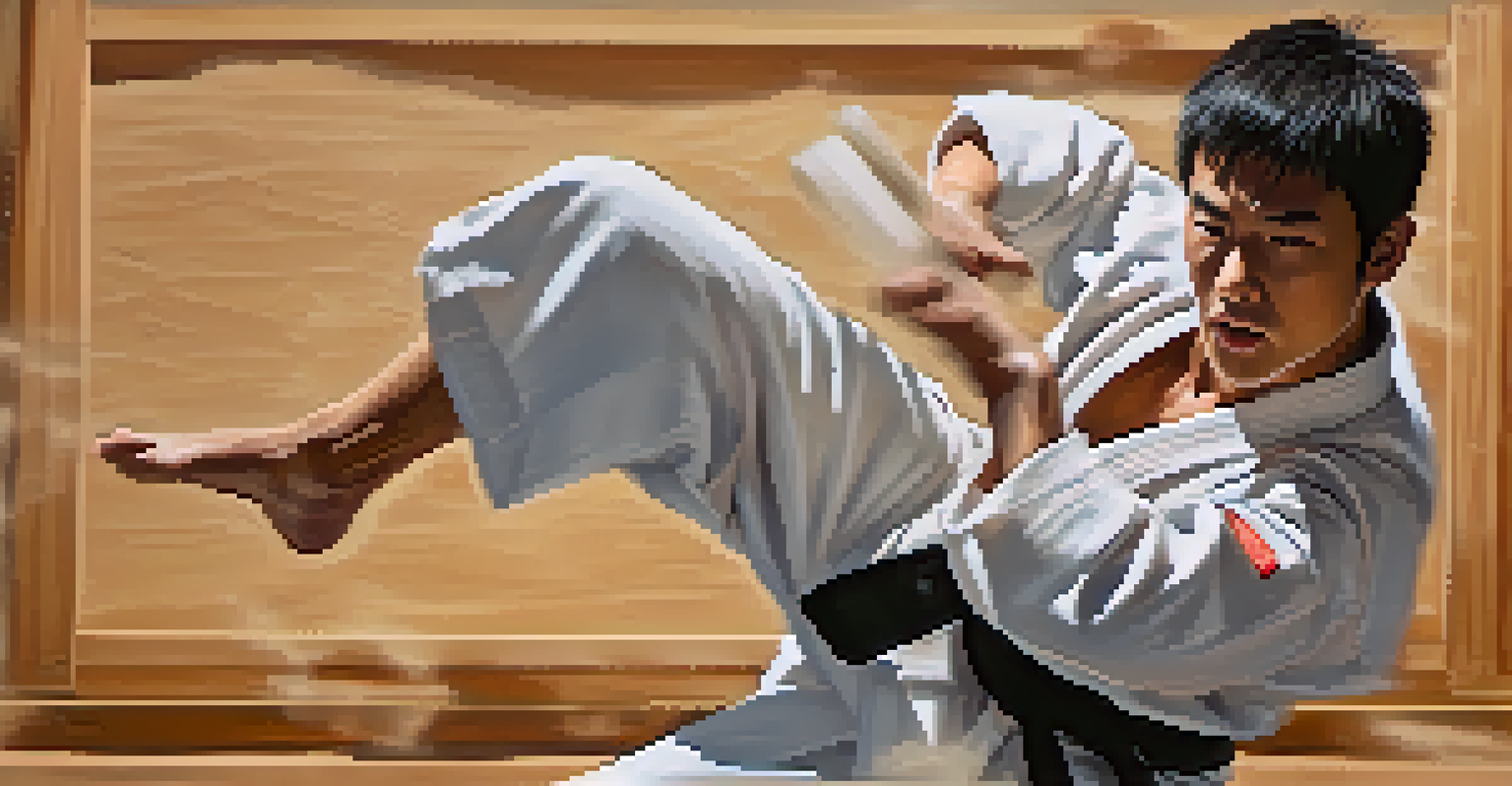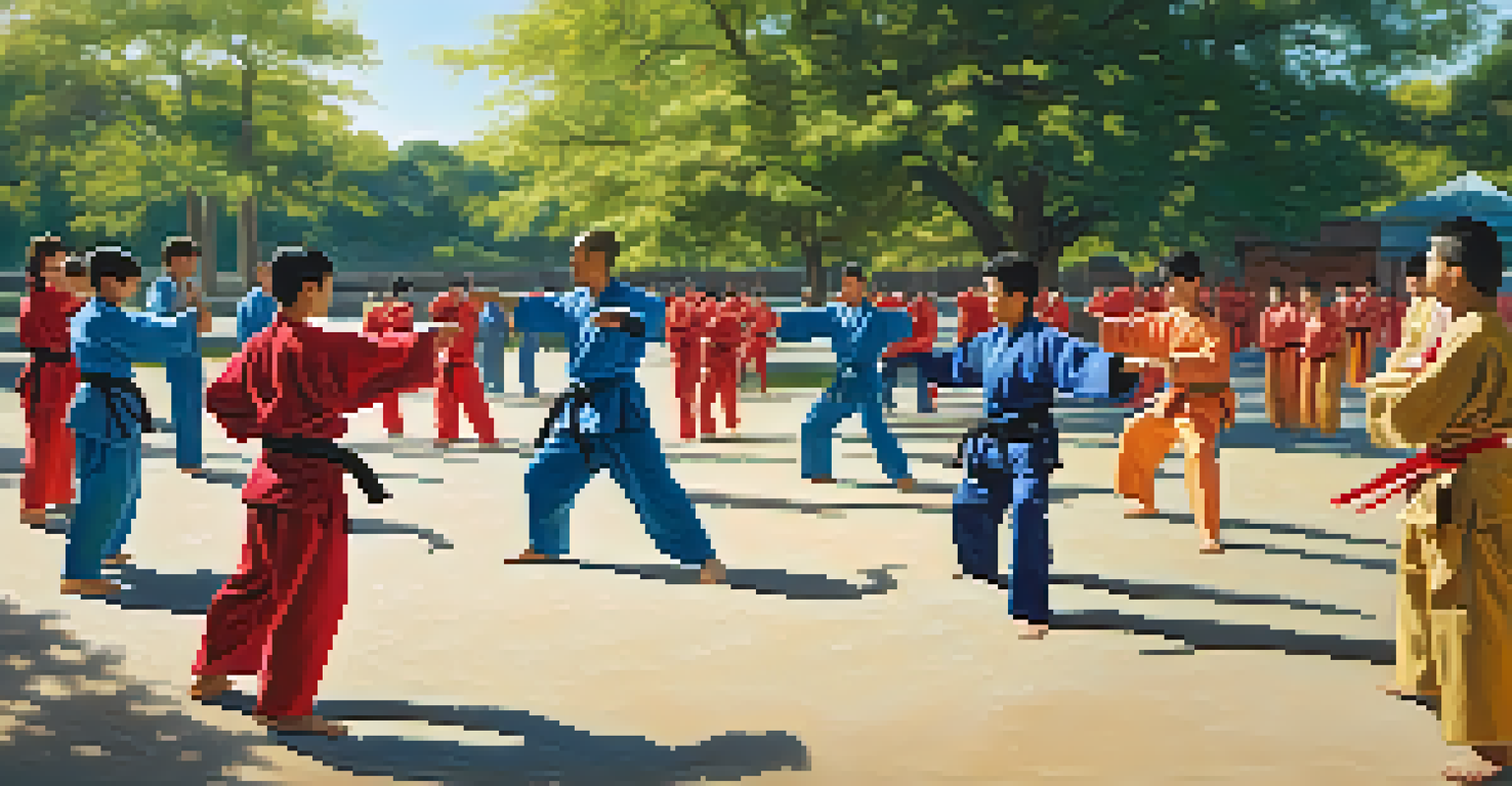Finding Balance: How Martial Arts Encourages Emotional Stability

Understanding Emotional Stability in Today’s World
Emotional stability refers to the ability to maintain a balanced emotional state, even in the face of stress or adversity. In a world that often feels chaotic, achieving this stability can be incredibly challenging. Many people struggle with anxiety, mood swings, and feelings of overwhelm, which can lead to unhealthy coping mechanisms. This is where martial arts can provide a unique solution, offering both physical and mental benefits.
The greatest glory in living lies not in never falling, but in rising every time we fall.
Martial arts, including disciplines like karate, judo, and taekwondo, are not just about physical prowess; they also emphasize mental discipline. Practitioners learn to control their emotions and reactions, which is crucial for achieving emotional stability. This focus on self-regulation helps individuals respond to life's ups and downs with greater composure and resilience.
By integrating physical training with mental conditioning, martial arts equip individuals with tools to navigate emotional turbulence. It’s like having a mental toolkit that you can draw from when faced with challenges, helping to cultivate a sense of calm and control.
The Role of Mindfulness in Martial Arts Practice
Mindfulness is the practice of being present and fully engaged in the moment, which is a fundamental aspect of many martial arts. When practitioners focus on their movements, they learn to quiet their minds and tune into their bodies. This heightened awareness can lead to improved emotional regulation, helping individuals manage stress and anxiety more effectively.

For instance, during a sparring session, martial artists must concentrate on their opponent's movements and their own reactions. This focus diverts attention away from external worries and fosters a sense of calm. It’s akin to meditation in motion, where every punch and kick becomes a way to channel emotions positively.
Martial Arts Boost Emotional Stability
Practicing martial arts fosters emotional balance by integrating physical training with mental discipline.
As practitioners build their mindfulness skills, they often notice an increase in their overall emotional awareness. This awareness is crucial for recognizing triggers that may lead to emotional instability, allowing for proactive management of feelings before they escalate.
Building Confidence Through Martial Arts Training
Confidence is a key ingredient in emotional stability, and martial arts training is a powerful way to cultivate it. As students progress through belts and techniques, they experience a sense of accomplishment that boosts self-esteem. This newfound confidence transcends the dojo, impacting other areas of their lives, from work to personal relationships.
What lies behind us and what lies before us are tiny matters compared to what lies within us.
Consider the story of a shy teenager who joins a martial arts class. Initially hesitant, they slowly begin to master new skills and gain recognition from peers and instructors. With each achievement, their confidence grows, and they start to approach social situations with greater ease and assurance.
This boost in confidence can create a positive feedback loop. As individuals feel more secure in their abilities, they are less likely to be influenced by external pressures, resulting in a stronger emotional foundation.
Developing Discipline and Self-Control
Discipline is a core principle of martial arts, and it plays a significant role in achieving emotional stability. The rigorous training required to master martial arts techniques instills a sense of routine and commitment. This discipline fosters self-control, which is essential when managing emotions in everyday life.
Practitioners learn that success comes from consistent effort and perseverance. For example, the journey of perfecting a difficult move teaches patience and resilience. These qualities can then be applied to face emotional challenges, allowing individuals to respond thoughtfully rather than react impulsively.
Mindfulness Enhances Emotional Control
Mindfulness in martial arts helps practitioners manage stress and improve emotional regulation.
By cultivating discipline through martial arts, individuals can develop strategies to cope with stress and emotional turmoil. This ability to pause and reflect before reacting is a crucial skill for maintaining emotional balance.
The Community Aspect of Martial Arts
One of the often-overlooked benefits of martial arts is the sense of community it fosters. Being part of a dojo creates a support network where individuals can share their experiences and challenges. This sense of belonging can be incredibly comforting, especially during tough emotional times.
When students train together, they not only learn techniques but also build friendships based on mutual respect and support. This camaraderie can help individuals feel less isolated in their struggles, knowing they have others who understand their journey.
Furthermore, having a supportive community encourages individuals to open up about their emotions and challenges. This sharing can lead to valuable insights and coping strategies, enhancing emotional stability.
Physical Fitness and Its Impact on Mental Health
There's a strong connection between physical fitness and mental health, and martial arts is an excellent way to achieve both. Regular physical activity releases endorphins, the body's natural mood lifters, which can help alleviate stress and anxiety. When individuals engage in martial arts, they not only improve their physical fitness but also enhance their emotional well-being.
Consider someone who practices martial arts regularly; they often report feeling more energized and less stressed. The physical demands of training require focus and energy, which can effectively distract from negative thoughts and feelings. This shift in focus can lead to a more positive mindset overall.
Community Support Strengthens Resilience
Being part of a martial arts community offers valuable support and shared experiences, enhancing emotional stability.
Additionally, the physical conditioning gained through martial arts contributes to overall health, which can have a cascading effect on emotional stability. When individuals feel good physically, it often translates into better mental health, creating a holistic approach to well-being.
Emotional Resilience Through Challenge and Growth
Martial arts present numerous challenges, from learning complex techniques to facing opponents in sparring matches. These challenges are not just physical; they also require emotional resilience. As practitioners confront and overcome obstacles in their training, they build the capacity to handle difficulties in life more effectively.
Think about the experience of breaking a board or earning a new belt; these moments symbolize personal growth and the ability to persevere. Each challenge faced in martial arts can serve as a metaphor for life's hurdles, teaching individuals that they are capable of overcoming adversity.

This process of confronting challenges ultimately leads to a stronger emotional foundation. Individuals learn that setbacks are a natural part of growth, enabling them to bounce back from disappointments with greater ease and determination.